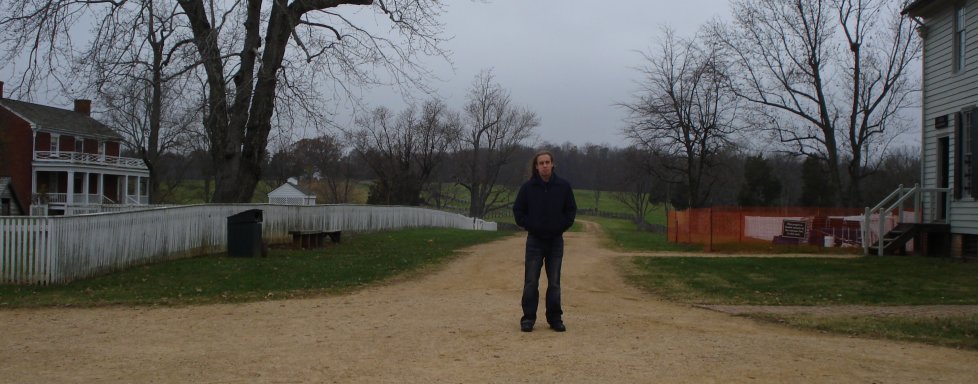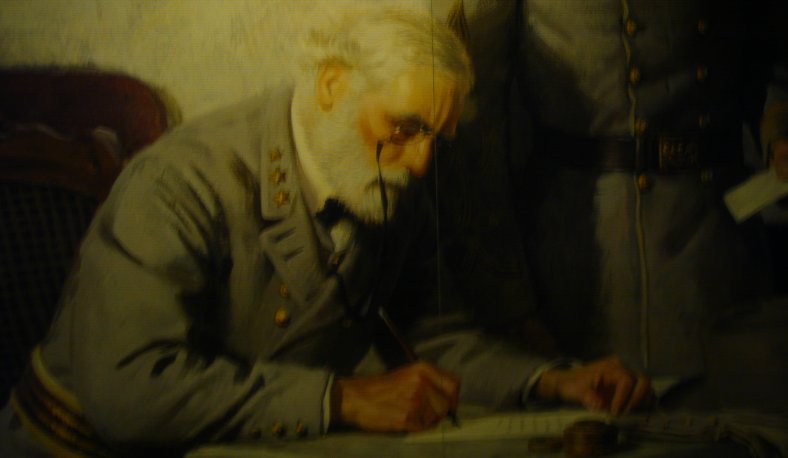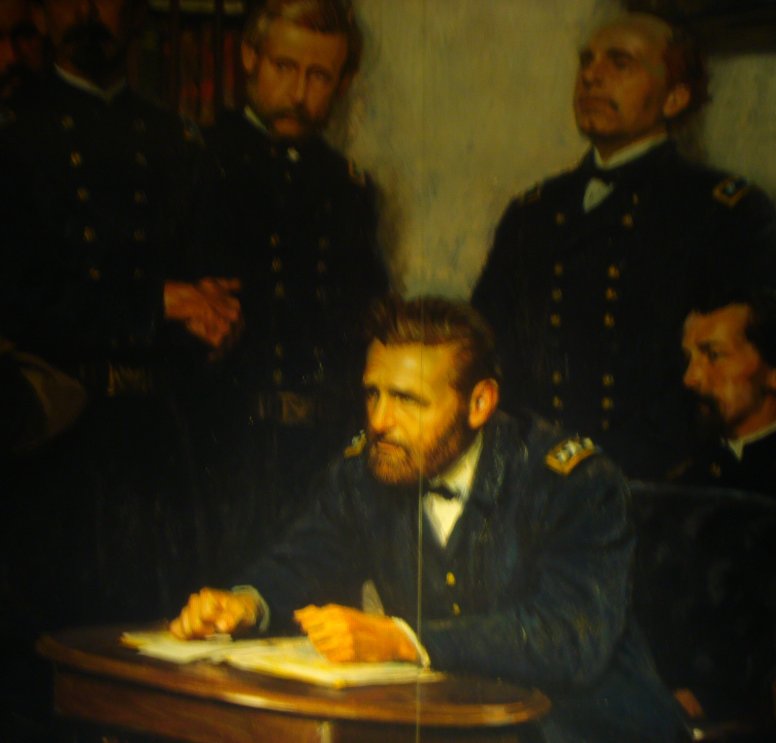We got to Appomattox too late yesterday, so we had to go this morning. It is not the big tourist season, so we had the place largely to ourselves.

I like these kinds of communities, with the old fashioned houses and the open spaces. Alex thought the houses were “lame.” But it is interesting to stand at the cross roads of history. They have done a good job of preserving and restoring the historical area, but I think they should get some animals. The community of the time would have featured horses, pigs, cows and chickens. Well … probably not exactly in April 1865, when the starving soldiers of the Army of Northern Virginia would have made short work of such rations on the hoof, but in normal times a community like this w/o animals would not be normal. I bet the Park Service could get some farm hobbyists to do it for nothing.

I thought back to April 1865 and the starving ragged Confederates up against Union forces that were better off but still not properly rationed. Both armies were exhausted. Robert E. Lee made the horrendous decision to surrender and the enlightened decision not to keep the fighting going on by guerilla tactics, as President Jefferson Davis wanted. The South was finished. No reason for more men to die and the country to be torn up even more for a lost cause. Grant and the Union made it as easy as it could be in such circumstances.

There was generosity, nobility and honor on both sides. April 9, 1865 was truly a day when humanity showed its better side amidst terrible suffering and hatred. As I wrote before, this is a even unique in human history. Grant later wrote, “I felt… sad and depressed at the downfall of a foe who had fought so long and valiantly, and had suffered so much for a cause though that cause was, I believe, one of the worst for which a people had ever fought.”
There is no such thing as destiny. People make history. If Grant, Lee or Lincoln had been lesser men – ordinary men – blood would have continued to flow and our great nation may have never recovered. But it could have been different.
Lincoln was there in spirit and he was a motivating force behind the generosity that Grant was able to give, but within a few days Lincoln would be dead, shot by that cowardly actor John Wilkes Booth. Had Booth struck a week earlier it is not likely that Grant could have offered such terms to Lee. The conflict might have continued as a desperate war of extermination.
Grant’s close friend William T Sherman would soon be similarly generous with General Joe Johnston, who would also prove as honorable as Robert E. Lee.
We all remember Lincoln’s Gettysburg Address, but the Second Inaugural is my favorite. It is not very long, so I copied it entire. I especially like the last paragraph.
| Fellow-Countrymen: AT this second appearing to take the oath of the Presidential office there is less occasion for an extended address than there was at the first. Then a statement somewhat in detail of a course to be pursued seemed fitting and proper. Now, at the expiration of four years, during which public declarations have been constantly called forth on every point and phase of the great contest which still absorbs the attention and engrosses the energies of the nation, little that is new could be presented. The progress of our arms, upon which all else chiefly depends, is as well known to the public as to myself, and it is, I trust, reasonably satisfactory and encouraging to all. With high hope for the future, no prediction in regard to it is ventured. | 1 |
| On the occasion corresponding to this four years ago all thoughts were anxiously directed to an impending civil war. All dreaded it, all sought to avert it. While the inaugural address was being delivered from this place, devoted altogether to saving the Union without war, urgent agents were in the city seeking to destroy it without war—seeking to dissolve the Union and divide effects by negotiation. Both parties deprecated war, but one of them would make war rather than let the nation survive, and the other would accept war rather than let it perish, and the war came. | 2 |
| One-eighth of the whole population were colored slaves, not distributed generally over the Union, but localized in the southern part of it. These slaves constituted a peculiar and powerful interest. All knew that this interest was somehow the cause of the war. To strengthen, perpetuate, and extend this interest was the object for which the insurgents would rend the Union even by war, while the Government claimed no right to do more than to restrict the territorial enlargement of it. Neither party expected for the war the magnitude or the duration which it has already attained. Neither anticipated that the cause of the conflict might cease with or even before the conflict itself should cease. Each looked for an easier triumph, and a result less fundamental and astounding. Both read the same Bible and pray to the same God, and each invokes His aid against the other. It may seem strange that any men should dare to ask a just God’s assistance in wringing their bread from the sweat of other men’s faces, but let us judge not, that we be not judged. The prayers of both could not be answered. That of neither has been answered fully. The Almighty has His own purposes. “Woe unto the world because of offenses; for it must needs be that offenses come, but woe to that man by whom the offense cometh.” If we shall suppose that American slavery is one of those offenses which, in the providence of God, must needs come, but which, having continued through His appointed time, He now wills to remove, and that He gives to both North and South this terrible war as the woe due to those by whom the offense came, shall we discern therein any departure from those divine attributes which the believers in a living God always ascribe to Him? Fondly do we hope, fervently do we pray, that this mighty scourge of war may speedily pass away. Yet, if God wills that it continue until all the wealth piled by the bondsman’s two hundred and fifty years of unrequited toil shall be sunk, and until every drop of blood drawn with the lash shall be paid by another drawn with the sword, as was said three thousand years ago, so still it must be said “the judgments of the Lord are true and righteous altogether.” | 3 |
| With malice toward none, with charity for all, with firmness in the right as God gives us to see the right, let us strive on to finish the work we are in, to bind up the nation’s wounds, to care for him who shall have borne the battle and for his widow and his orphan, to do all which may achieve and cherish a just and lasting peace among ourselves and with all nations. |
